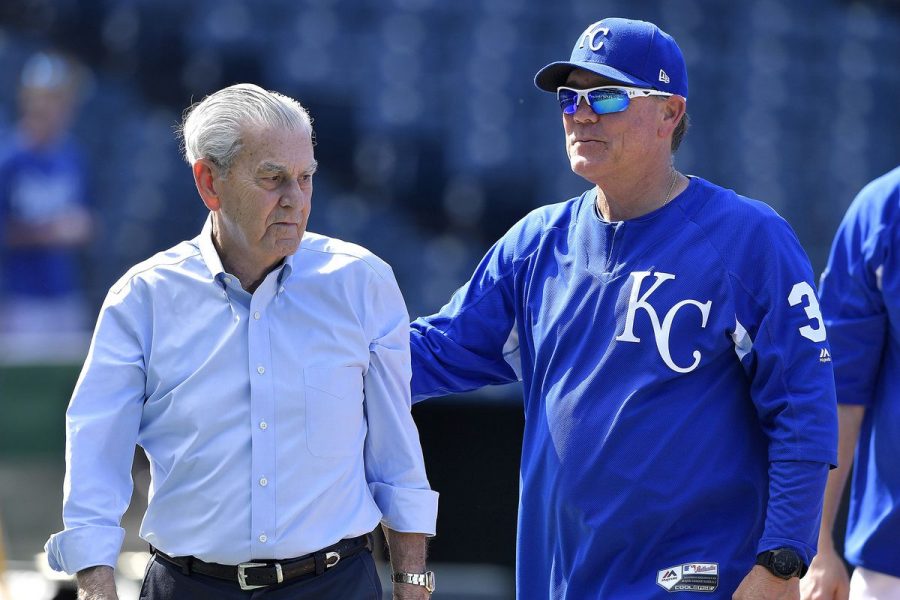Royals sold to local businessman
David Glass, Royals owner, and Ned Yost, Royals manager, talk before a game. Glass announced on Aug. 30 that he would sell the team to John Sherman, businessman. Glass has been the sole owner of the team since 2000.
October 4, 2019
On Aug. 27, news shattered the realm of Kansas City sports, as reports surfaced that indicated David Glass, Royals owner, was looking to sell the team. The leak was unprecedented, since Glass indicated that he was content with his ownership. However, health issues have forced him to differ his stance, and on Aug. 30, he officially announced that the team was to be sold to John Sherman, businessman, for approximately $1 billion in Nov., as soon as the collective bargaining agreement allows.
Sherman will become the third owner in Royals franchise history, following the esteemed Ewing Kauffman, team founder, and Glass. Kauffman brought Major League Baseball back to Kansas City following the relocation of the Athletics to Oakland and was beloved by many around the city. Following his death in 1993, then-Royals Stadium was renamed to Kauffman Stadium.
Glass’ health issues are something that have been completely hidden from the public until now. The sale of the club was something that was an “urgent” priority for the 83-year-old, as he likely did not want the organization in the same state of disarray that plagued the club following Kauffman’s death should he unexpectedly pass away.
A businessman from Kansas City, Sherman is a former Royals season ticket holder and owned a suite in Arrowhead Stadium, home of the Chiefs. Though discussions have never started (or at least surfaced), this should ensure that the team stays put when its lease at the Truman Sports Complex expires in 2032.
One of the big issues that will undoubtedly lead to a large debate is the team constructing and moving into a new stadium in downtown Kansas City. Though Kauffman Stadium underwent an extensive $230 million renovation just 10 years ago, some cite its location as out of the way and say that the concrete that makes it up is quickly aging. A new stadium would likely cost upwards of $1 billion and would probably require a slight tax increase to get funds, something that many say is unnecessary for a city the size of Kansas City. Sherman has not indicated which side of the issue he leans towards.
One of the big criticisms of Glass’ tenure as owner was his seemingly cheap way of operating the club. Moves such as signing Brandon Moss, designated hitter, and Kris Medlen, pitcher, as well as not trading Ian Kennedy, pitcher, to save approximately $20 million have resulted in fewer wins over the past few seasons. The trade-in was that the organization was able to save over $30 million at the cost of their respectability among the American League standings.
With an owner that is presumably willing to spend more money in free agency, signing big names such as Anthony Rendon, Nationals third baseman, or Gerrit Cole, Astros pitcher, to long term contracts for the latter half of the team’s rebuild is not out of the question. Building around minor league talent such as Brady Singer and Jackson Kowar, pitchers, should be the main focus for new ownership and with the announced retirement of Ned Yost, manager, a youthful manager such as Carlos Beltran, former Royals outfielder, would be a great fit for the open position.
Sherman will be forced by Major League Baseball to sell his minority stake in the Cleveland Indians before November to avoid an obvious conflict of interest. Additionally, he currently is the vice chairman of the Indians organization, a title which he will also be forced to relinquish before the deadline per the rules of the current collective bargaining agreement.
The sale to Sherman will be a great thing for the Royals organization in the long term; with a rebuild in progress, the last thing the Royals need is an old way of thinking in the front office and a clean house would represent, if nothing else, a new, brighter era for baseball in Kansas City.

